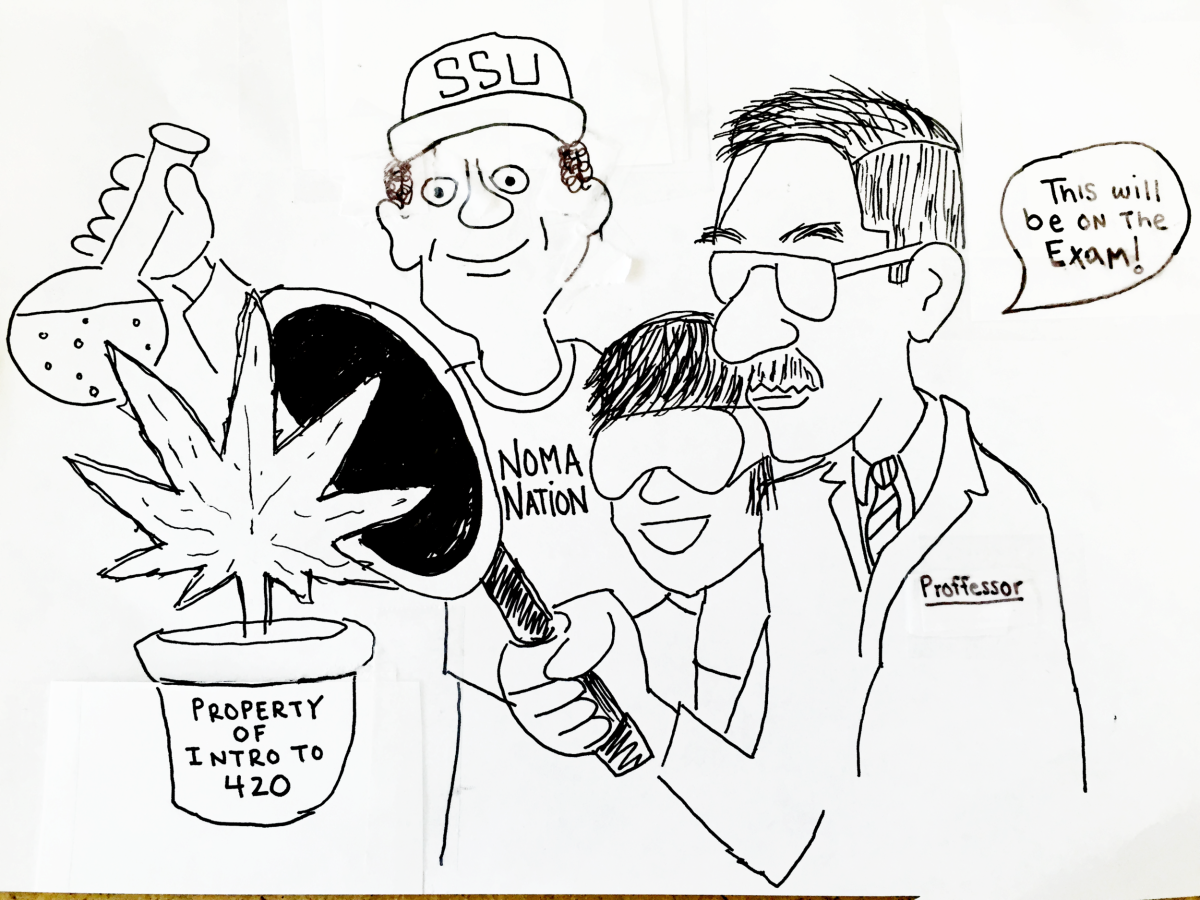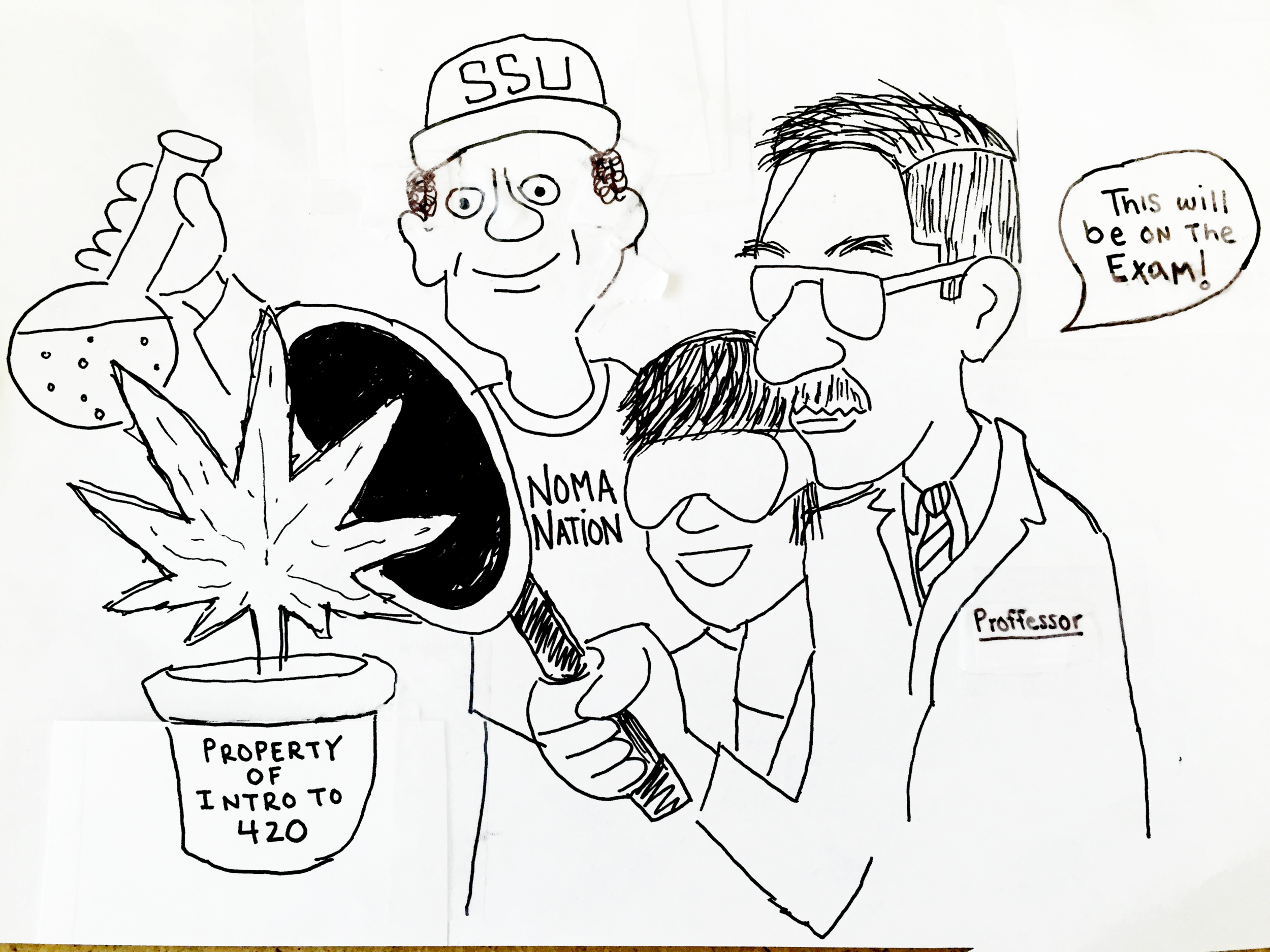On March 11, our campus will host a medical cannabis symposium. But before we get into that, let’s rewind to Nov. 8, 2016 — election day. The United States got a new president and California got marijuana.
California voters passed Proposition 64 making recreational marijuana legal in the state. Now with marijuana being legalized, the education into the cannabis industry is relevant and important.
This brings us to what’s happening on March 11 at Sonoma State University’s School of Extended Education and International Education – the medical cannabis symposium. The one-day course will be taught by the United Patients Group and offered to medical professionals, nursing students and the public.
The course will offer education on the history of cannabis, cannabinoids and terpenes, dosing, administration, legal implications and a variety of medical conditions such ascancer and neurological disorders.
With this one-day symposium, did Sonoma State just open the door to the possibility of having an actual accredited course about cannabis on campus? Well it’s not that simple. Since cannabis is illegal at the federal level and Sonoma State is a public university, it’s barred from offering courses on the cannabis business and entrepreneurship, but they are able to offer courses on the medical education of cannabis – and the STAR believes this is a good start.
Cannabis-based courses in college arenot a new thing. Many universities across the country are beginning to offer classes about the business, law, safety and medical side of marijuana. Prestigious universities such as Ohio State, Vanderbilt and even Harvard Law are offering courses based around cannabis. The University of Colorado received a $839,000 state- funded grant to research the effects of high potency cannabis extracts, otherwise known as “dabbing.” Humboldt State offers the Humboldt Institute for Interdisciplinary Marijuana Research, “a research and analysis organization created to fill various information gaps about marijuana issues.” Chico State currently offers a student organized cannabis club.
Cannabis Vocational colleges are also popping up around the country. Oakland’s Oaksterdam University was founded in 2007 and offers a variety of classes from cannabis horticulture to legal issues, politics, history, civics, economics, extracts, topical applications, business management, dispensary management and cooking with cannabis.
One of the reasons many schools are starting to expand their cannabis education opportunitiesis money. The cannabis industry is becoming one of the fastest growing industries in the world.
A study held by the research firm the ArcView Group, found that non-medical legal recreational sales grew from $351 million to $998 million in 2015. With California legalizing the recreational use of marijuana, those numbers are expected to grow even more.
With the possible increased revenue in legal marijuana sales, more jobs are opening up in the cannabis industry. The economic consulting firm, “The Marijuana Policy Group” did a study after marijuana was legalized in Colorado and found that the legalization created 18,000 jobs and $2.4 billion in economic activity in its first year.
If these numbers repeat themselves in California, Sonoma State students should have the opportunity to be educated in this fast-growing new job market. With Sonoma State’s proximity to the “Emerald Triangle” region in Northern California, encompassing three counties, Mendocino, Humboldt and Trinity, making it the largest cannabis growing region in the United States, it would make sense to see the future of education and the cannabis industry coming together.
Sonoma State has never shied away from being a pioneer in education system. In 2016 the university broke ground on its $9 million Wine Institute and recently offered a certificate on “Craft Beer Appreciation.”
So offering a course on cannabis does not seem out of the question. With the rising cannabis industry bringing jobs and revenue to California and Sonoma State’s location, it only makes sense for the university to join the party. Hosting this symposium is a good, safe first step. But we hope it’s not the last.





![[Both photos courtesy of sonoma.edu]
Ming-Ting Mike Lee stepped in as the new SSU president following Sakakis resignation in July 2022](https://sonomastatestar.com/wp-content/uploads/2024/04/CC4520AB-22A7-41B2-9F6F-2A2D5F76A28C-1200x1200.jpeg)



























